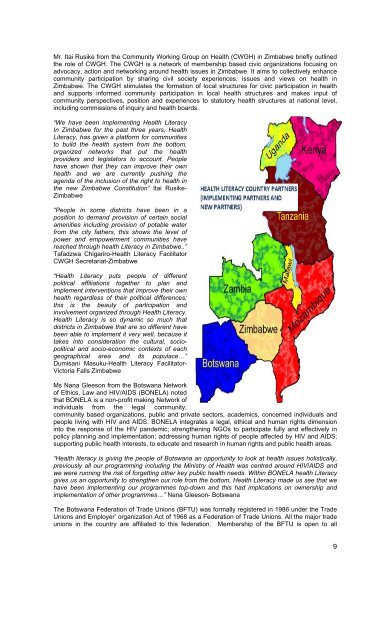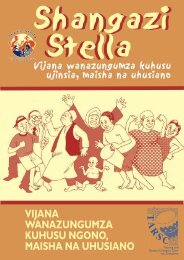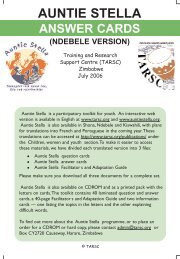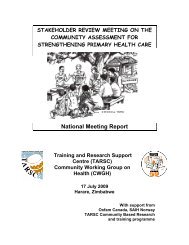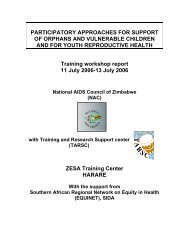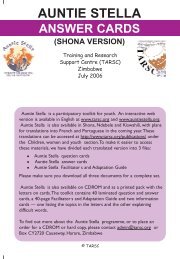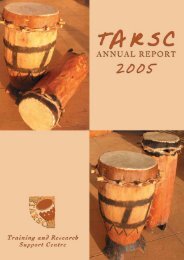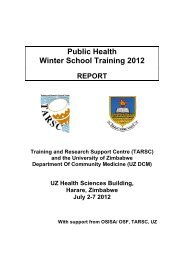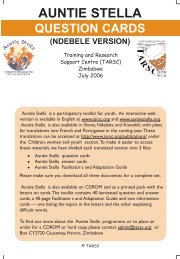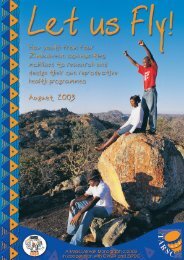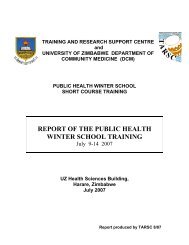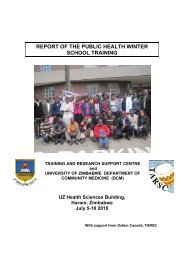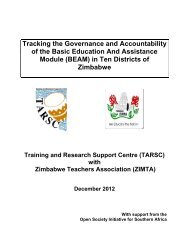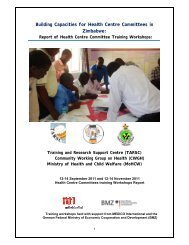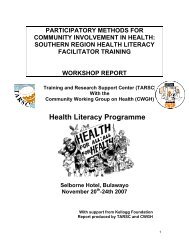HLregional meeting09.pdf - Training and Research Support Centre
HLregional meeting09.pdf - Training and Research Support Centre
HLregional meeting09.pdf - Training and Research Support Centre
You also want an ePaper? Increase the reach of your titles
YUMPU automatically turns print PDFs into web optimized ePapers that Google loves.
Mr. Itai Rusike from the Community Working Group on Health (CWGH) in Zimbabwe briefly outlined<br />
the role of CWGH. The CWGH is a network of membership based civic organizations focusing on<br />
advocacy, action <strong>and</strong> networking around health issues in Zimbabwe. It aims to collectively enhance<br />
community participation by sharing civil society experiences, issues <strong>and</strong> views on health in<br />
Zimbabwe. The CWGH stimulates the formation of local structures for civic participation in health<br />
<strong>and</strong> supports informed community participation in local health structures <strong>and</strong> makes input of<br />
community perspectives, position <strong>and</strong> experiences to statutory health structures at national level,<br />
including commissions of inquiry <strong>and</strong> health boards.<br />
“We have been implementing Health Literacy<br />
In Zimbabwe for the past three years, Health<br />
Literacy, has given a platform for communities<br />
to build the health system from the bottom,<br />
organized networks that put the health<br />
providers <strong>and</strong> legislators to account. People<br />
have shown that they can improve their own<br />
health <strong>and</strong> we are currently pushing the<br />
agenda of the inclusion of the right to health in<br />
the new Zimbabwe Constitution” Itai Rusike-<br />
Zimbabwe<br />
“People in some districts have been in a<br />
position to dem<strong>and</strong> provision of certain social<br />
amenities including provision of potable water<br />
from the city fathers, this shows the level of<br />
power <strong>and</strong> empowerment communities have<br />
reached through health Literacy in Zimbabwe..”<br />
Tafadzwa Chigariro-Health Literacy Facilitator<br />
CWGH Secretariat-Zimbabwe<br />
“Health Literacy puts people of different<br />
political affiliations together to plan <strong>and</strong><br />
implement interventions that improve their own<br />
health regardless of their political differences;<br />
this is the beauty of participation <strong>and</strong><br />
involvement organized through Health Literacy.<br />
Health Literacy is so dynamic so much that<br />
districts in Zimbabwe that are so different have<br />
been able to implement it very well, because it<br />
takes into consideration the cultural, sociopolitical<br />
<strong>and</strong> socio-economic contexts of each<br />
geographical area <strong>and</strong> its populace…”<br />
Dumisani Masuku-Health Literacy Facilitator-<br />
Victoria Falls Zimbabwe<br />
Ms Nana Gleeson from the Botswana Network<br />
of Ethics, Law <strong>and</strong> HIV/AIDS (BONELA) noted<br />
that BONELA is a non-profit making Network of<br />
individuals from the legal community,<br />
community based organizations, public <strong>and</strong> private sectors, academics, concerned individuals <strong>and</strong><br />
people living with HIV <strong>and</strong> AIDS. BONELA integrates a legal, ethical <strong>and</strong> human rights dimension<br />
into the response of the HIV p<strong>and</strong>emic; strengthening NGOs to participate fully <strong>and</strong> effectively in<br />
policy planning <strong>and</strong> implementation; addressing human rights of people affected by HIV <strong>and</strong> AIDS;<br />
supporting public health interests, to educate <strong>and</strong> research in human rights <strong>and</strong> public health areas.<br />
“Health literacy is giving the people of Botswana an opportunity to look at health issues holistically,<br />
previously all our programming including the Ministry of Health was centred around HIV/AIDS <strong>and</strong><br />
we were running the risk of forgetting other key public health needs. Within BONELA health Literacy<br />
gives us an opportunity to strengthen our role from the bottom, Health Literacy made us see that we<br />
have been implementing our programmes top-down <strong>and</strong> this had implications on ownership <strong>and</strong><br />
implementation of other programmes…” Nana Gleeson- Botswana<br />
The Botswana Federation of Trade Unions (BFTU) was formally registered in 1986 under the Trade<br />
Unions <strong>and</strong> Employer’ organization Act of 1968 as a Federation of Trade Unions. All the major trade<br />
unions in the country are affiliated to this federation. Membership of the BFTU is open to all<br />
9


